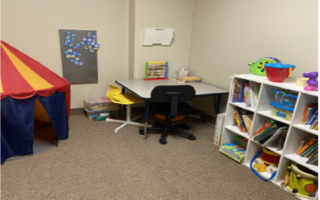My son Mateo was always a little more sensitive than other kids. He clung to me longer at preschool drop-off, cried at loud noises, and asked questions no seven-year-old should have to think about—“Why do people have to die?” and “What if you forget me when I’m gone?”
But after my divorce, something shifted. He stopped sleeping through the night. Started chewing his nails until they bled. Some days he didn’t speak at all, just stared at his plate like the world was too much.
I knew he needed help. I needed help. But I was barely keeping the lights on, working double shifts at a diner and covering rent on a two-bedroom in east Fort Collins. Therapy? That felt like something for people who had more money, more time, more everything.
Still, one night, after another school call about a breakdown during math class, I opened my laptop and searched: Fort Collins Medicaid counselors. I didn’t know if such a thing even existed, but I was desperate.
The page I found was simple—no fancy photos, just straightforward language. “Mental health practitioners in Fort Collins that accept Medicaid” There was a number. I called.
A woman answered on the second ring. Her voice was calm in a way that made me cry immediately. She didn’t rush me. She didn’t make me explain myself five different ways. She just said, “We can help.”
We had our first session the following Tuesday. Mateo clutched his stuffed sloth the whole way there.
The waiting room was quiet. Not cold-quiet, but safe-quiet. There were coloring books. A kid-size table. I sat stiffly on the adult side, practicing what I would say if they judged me. But they didn’t.
The therapist welcomed Mateo like she already knew him. She didn’t dive in right away. Just asked about his sloth, his favorite Pokémon, his best friend at school. I watched his shoulders lower.
By the second session, he was drawing pictures of his “worry monster.” He gave it three heads and spiky teeth. The therapist helped him name each fear. Then they talked about ways to shrink it.
At home, he started humming again. That’s how I knew something was working.
The counselor also looped me in without making me feel dumb or defensive. She offered small, manageable things: a feelings chart on the fridge, five-minute evening check-ins, a bedtime routine that didn’t start with a screen.
It wasn’t perfect, but it was better. And better, for us, felt like a miracle.
By session four, Mateo told her, “I don’t feel like I’m broken anymore.” I sat in the car afterward and wept.
The next few weeks were quieter. Not easy—but quieter. Mateo began sleeping through the night again. He stopped asking if I was mad when I wasn’t. He still barely touched his dinner, but at least he sat at the table. And when Tuesday rolled around, he put on his hoodie without being asked.
I remember our third visit like a photograph. He told the counselor about the hallway at school that made his chest hurt. She nodded, didn’t press him, and instead helped him draw what a safe hallway might look like. He sketched soft lighting, plants, and a teacher holding a sign that said “Take Your Time.”
That picture stayed on their bulletin board for the next two sessions. I think it made him feel proud. Seen.
I started to notice changes in myself too. Before, I walked around like I was one missed paycheck away from collapse. And maybe I still was. But with someone on our side—someone trained to help—I didn’t feel as alone.
I’d sit in the car outside the clinic, sometimes for the full hour, just breathing. It felt like the only place in town where I wasn’t being asked for something.
At session five, the counselor gently invited me into the room for the last ten minutes. She asked Mateo if he wanted me there, and when he nodded, I almost burst into tears.
She said, “He’s naming his feelings now. That’s a big step.”
I didn’t know how to respond, so I nodded, biting the inside of my cheek.
It wasn’t a magic fix. I still struggled to afford groceries some weeks. I still worked two jobs, rotating shifts, and sometimes forgot what day it was.
But there was a rhythm forming. A beat of hope underneath the chaos.
Mateo started keeping a notebook—a feelings journal, the counselor called it. Some days it was one word, some days three pages. One morning, he handed it to me before school. Inside was a single sentence: “I don’t feel broken anymore.”
That one hit me in the ribs. Not because I thought he had been—but because I realized how deeply he had.
Now, months later, we’re still going. Not every week, but often enough to stay steady. Mateo’s teacher emailed me recently to say he raised his hand in class. That’s never happened before.
I think back to that first desperate night—the fear, the shame of not knowing where to turn. And then I remember that quiet phone call, that first appointment, that “It’s okay to call anytime” card.
Sometimes, the hardest thing isn’t asking for help—it’s believing help exists for someone like you.
But it does. It did. And it made all the difference.




